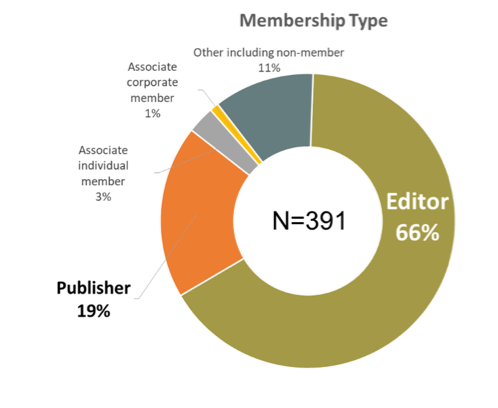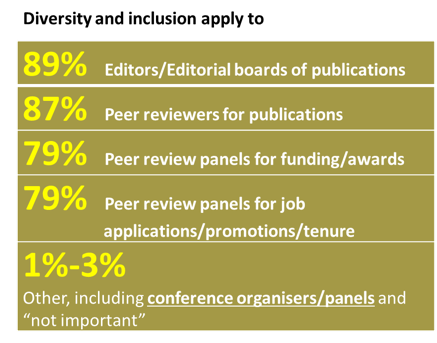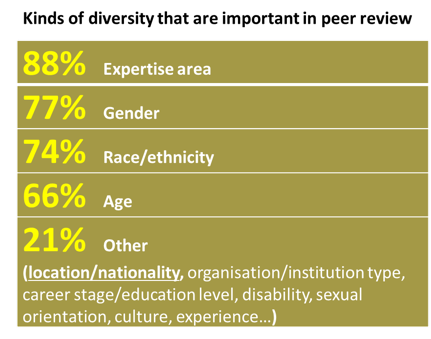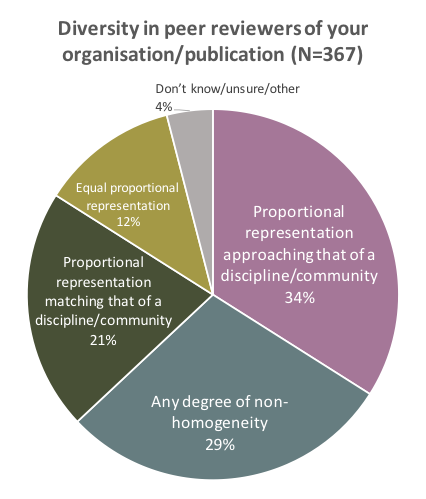Diversity in Peer Review
 The theme of this year’s Peer Review Week (10-15 September 2018) was diversity and inclusion in peer review. To understand more about how the COPE community views this topic, the COPE Member Services Subcommittee launched a 3-week online Peer Review Diversity Survey in Peer Review Week. Thank you to the 391 respondents who took part in the anonymous survey, most of whom were editors (66%) or publishers (19%). Here is a summary of the replies, including some that were written in by respondents in the “other” category:
The theme of this year’s Peer Review Week (10-15 September 2018) was diversity and inclusion in peer review. To understand more about how the COPE community views this topic, the COPE Member Services Subcommittee launched a 3-week online Peer Review Diversity Survey in Peer Review Week. Thank you to the 391 respondents who took part in the anonymous survey, most of whom were editors (66%) or publishers (19%). Here is a summary of the replies, including some that were written in by respondents in the “other” category:
• 77% of respondents agreed or strongly agreed that diversity and inclusion are important in peer review
•  Diversity and inclusion apply to
Diversity and inclusion apply to
- Editors/Editorial boards of publications (89%)
- Peer reviewers for publications (87%)
- Peer review panels for funding/awards (79%)
- Peer review panels for job applications/promotions/tenure (79%)
- Other (3%), including conference organisers/panels
 • Kinds of diversity that are important in peer review:
• Kinds of diversity that are important in peer review:
- Area of expertise (88%)
- Gender (77%)
- Race/ethnicity (74%)
- Age (66%)
- Other (21%), including location/nationality, organisation/institution type, career stage/education level, disability, sexual orientation, culture, experience
•  Definitions of peer reviewer diversity (N=367):
Definitions of peer reviewer diversity (N=367):
- Proportional representation approaching that of a discipline/community (34%)
- Any degree of non-homogeneity (29%)
- Proportional representation matching that of a discipline/community (21%)
- Equal proportional representation (12%)
- Other (4%), including:
- substantial degree of non-homogeneity/heterogeneity
- proportional representation at least matching that of the discipline/community
- proportional to the diversity in published topics
- integrity/competence/expertise is more important than diversity
• My employer/publication (N=384)…
- …has achieved an ideal level of diversity in its peer reviewer pool (37%)
- …values diverse involvement and opinions in its peer review process (71%)
- …has policies to respond appropriately to alleged cases of discrimination in its peer review process (43%)
- …has diversity policies for nominating/selecting members for its peer reviewer pool (25%)
- …has diversity policies for selecting peer reviewers when evaluating individual manuscripts/applications (26%)
- …provides in-house training to promote diversity and inclusion in peer review (13%)
- …provides training to potential peer reviewers, to promote diversity in its peer review pool (14%)
• Additional comments from several respondents:
- …diversity depends on the nature of the journal
- …diversity may not be as important as a reviewer’s ability, integrity, and willingness
- …relevant data are not or are not yet collected
- …in general, the reviewer pool needs expanding to avoid overburdening the same individuals
The survey results show that diversity and inclusion are valued and may be context-specific, and that relevant policies and training are commonly lacking. Increasing the diversity of reviewers as well as opportunities for them to provide different perspectives could potentially both improve peer review quality and reduce bias. Diversity and inclusion, respectively, could be viewed as good theory (maintaining a diverse database of willing and able reviewers) and good practice (having procedures in place to encourage participation and involvement so as to actually obtain diverse views and opinions from reviewers).
Recent initiatives to encourage diversity and inclusion in research publishing include a Diversity and Inclusion Manifesto of the Association of Learned and Professional Society Publishers, and the establishment of the Coalition for Diversity & Inclusion in Scholarly Communication (C4DISC). However, as reflected by recommendations in the Publons 2018 Global State of Peer Review report and during events taking place in Peer Review Week, there is a need for fairness and balance in representing a wide variety of author and researcher communities, especially those in emerging economies, and for improved reviewer training and recognition.
COPE plans to make use of available resources and results of the 2018 COPE Peer Review Diversity Survey and will hold further discussions among the COPE community to inform its guidance for members, as well as its own strategies for diversity and inclusion. It is clear that a holistic and concerted effort is called for, and COPE is keen to bring together multiple stakeholders to the discussion, including publishers, editors, peer review services, and research institutions.
Chair, Member Services, COPE Trevor Lane